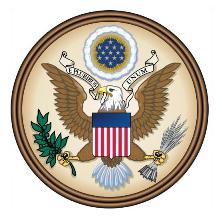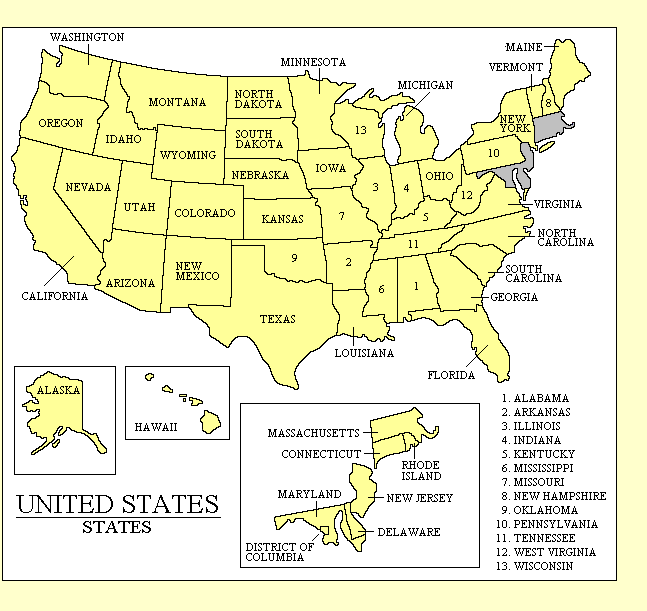
UNITED STATES OF AMERICA
Official name: United States of America
• Location: North America
• International organisations: Asia-Pacific Economic Co-operation Forum, Group of Eight, Group of Twenty,
North Atlantic Treaty Organisation, Organisation of American States, Organisation for Economic
Co-operation and Development, Organisation for Security and Co-operation in Europe,
United Nations, World Trade Organisation
• Borders: Canada, Mexico
• Coastline: Atlantic Ocean, Arctic Ocean, Caribbean Sea, Pacific Ocean
• Land area: 9,629,091 km2
• Population: 308,100,000
• Annual GDP (PPP) per capita: US$46,400 (2009 CIA estimate). World ranking: 8. Although the US is only the
eighth-wealthiest country on this ranking, it is by far the wealthiest big country (more than 10 million people).
• Ethnicity: European 83.5%, African-American 12.4%, Asian 3.3%, Native American 0.8%
• Languages: English is the official language and is almost universally understood. Spanish is widely spoken in areas
bordering Mexico and in many cities. Indigenous languages, including Inuit languages in Alaska and Hawaiian
in Hawaii, survive in some places. Many languages are spoken in immigrant communities.

• Religion: The Constitution forbids the establishment of any religion. The United States is nevertheless
the most religiously observant of any major western country. The majority of
the population are Christians (Protestant 56%, Catholic 28%). There is a 2% Jewish minority, and small
minorities of Moslems, Buddhists and others. Only 10% profess no religion.
• Form of government: Federal presidential democratic republic. The USA consists of 50 states,
which retain extensive legislative powers. Puerto Rico is a self-governing Commonwealth in free
association with the United States. There are a number of other small, self-governing
dependent territories.
• Capital: Washington. The District of Colombia, which includes Washington, has local self-government.
• Constitution: The
Constitution of the United States was adopted on 4 March 1789. It has been amended many times but is unchanged in essentials.

• Head of state: The President, elected for a four-year term by an Electoral College, the members of which are
elected by the people. Each state elects the same number of delegates to the Electoral College as it has members
in the Congress. Since each state has two Senators regardless of population, this creates a bias in the Electoral
College in favour of the smaller states. Also, members of the Electoral College are not bound by law to vote for the
presidential candidate in whose name they were elected.
• Head of government: The President appoints members of the
Cabinet but their appointments must be confirmed by the Senate. The President
can dismiss members of the Cabinet at will. Both the President and members of
the Cabinet can be removed from office by the Congress by a process of
impeachment.
• Legislature: The Congress of the United States is a bicameral
legislature. The House of Representatives has 435 members,
elected for two-year terms from single-member districts of approximately equal
population, although district boundaries are severely gerrymandered in a number of states, preventing effective
party competition. The Senate has 100 members elected for six-year terms.
Two Senators are elected from each state, regardless of population.
• Electoral authority: All American elections are conducted by the states, and there is
no national election authority. The Federal Election Commission
supervises elections and campaign fundraising law but does not conduct elections.
• Freedom House 2011 rating: Political Rights 1, Civil Liberties 1
(I disagree with the awarding of the highest Political Rights rating to the United States, partly because of the
undemocratic nature of the Electoral College system of electing the President, partly because of the lack of
national standards for the conduct of elections by the states, and partly because of the shameless gerrymandering of
electoral boundaries. I also disagree with the awarding of the highest Civil Liberties rating
to the United States, principally because of the continued use of the death penalty.)
• Transparency International Corruption Index: 71% (22 of 178 countries rated)
• Reporters Without Borders Press Freedom 2010 Index: 93.2% (20 of 178 countries rated)
• Heritage Foundation Economic Freedom 2010 Index: 77.8% (9 of 179 countries rated)
Political history
The United States, originally a group of British colonies, declared their
independence in 1776. The 1789 constitution established a presidential democracy which
has been maintained essentially unchanged since. The President is chosen by
an Electoral College, in which each state is represented according to its
population. Until 1824 the Electoral College was elected by the state
legislatures. Since then it has been directly elected. Members of the Senate
were also elected by the state legislatures until 1913, when the Seventeenth
Amendment to the Constitution provided for direct election.

The American colonies had elected assemblies before independence, though
usually with restrictive property franchises. During the early 19th century these
were removed, and by the time of the Civil War all adult white males had the
vote. In the northern states free African-American males also had the
vote.
After the Civil War slavery was abolished and the Fifteenth Amendment
to the Constitution guaranteed the franchise to all regardless of race. But
African-Americans were denied the right to vote in the southern
states by means such as the poll tax and literacy tests, and
also by violence and intimidation. Agitation for women's suffrage began in the 1860s. The first state to allow
women to vote was Wyoming, in 1890. The first woman was elected to
Congress in 1916. Women did not gain the right
to vote in all states until the passage of the Nineteenth Amendment in 1920.
Until the 1960s most African-Americans in the south could not vote. After
World War II a civil rights movement began to campaign against this situation.
This led to
the Civil Rights Acts of 1957, 1960 and 1964, which forced the southern states
to stop restricting voting rights. By the late 1960s all adult Americans could
vote. The voting age was lowered to 18 in 1971. Voting in the United States has
always been voluntary.
The United States has one of the most stable two-party systems in the world. Since the
Civil War the Democratic Party and the Republican Party
have alternated peacefully in
office. The Democratic Party is descended from a party founded by Thomas Jefferson in
the 1790s. It is a broadly liberal party, though it has both conservative
and radical wings. The Republican Party, founded as an anti-slavery party in the 1850s,
is firmly and increasingly conservative, although
some liberal Republicans survive.
No other party has succeeded in establishing itself.
Independent candidates for President have sometimes polled well, and independents are
occasionally elected as state Governors, but no minor party holds seats in the Congress
or in any state legislature. This is partly because of the unique American system of
primary elections, which allows voters to chose their party's candidates for all offices.
The November 2000 Presidential elections were the most contentious in American
history. The Democratic candidate, Vice-President Al Gore, polled a plurality (though not a
majority) of the vote, but was unable to win a majority in the Electoral College, which
contains a bias towards the smaller, Republican, states. The outcome in the
closely-contested state of Florida was disputed for weeks, until the Supreme Court, in
what many considered a partisan decision, declared that Republican candidate, Governor
George W Bush of Texas, had carried the state. At this point Gore conceded the election.
Bush was narrowly but legitimately re-elected in November 2004. In 2006 the Democrats gained
control of both houses of the Congress, leaving Bush a "lame duck" for the last two years of
his Presidency. At the 2008 election, the Democratic candidate, Senator
Barack Obama, had a comfortable win over the
Republican candidate, Senator John McCain, becoming America's first African-American President.
The Democrats increased their majorities in both houses of the Congress. Contuining economic
difficulties, however, allowed the Republicans to make a rapid recovery, and they regained
control of the House of Representatives at the 2010 midterm elections. President Obama faces
re-election in November 2012.
Updated November 2011
|


